unity 中excel转json插件
Posted 丛小胖
tags:
篇首语:本文由小常识网(cha138.com)小编为大家整理,主要介绍了unity 中excel转json插件相关的知识,希望对你有一定的参考价值。
1 工具简介
将策划配置的excel转换成程序使用json文件。方便策划是excel的功能。
2文件的放置和生成
需要将excle文件放置到项目中的Excel文件夹下面。
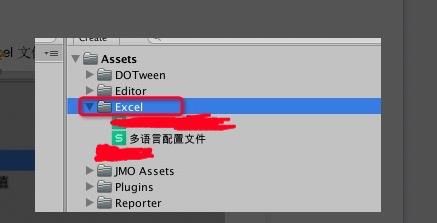
生成的文件会在Res/Config文件夹下面
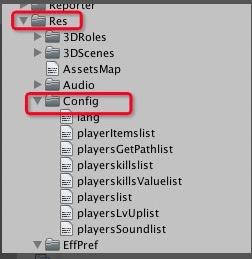
生成json文件只需要点击Tools下的ExcelTools就可以了

3 excel文件的格式

第一行是说明,不具有实际意义
第二行为属性的名字,json文件的key值。不能使用数字开头,特殊符号开头,不能使用程序内的关键字,如:string,int。
第三行是程序内使用的类型,支持的类型有 string int float double bool。
bool中fasle,0,空白 都代表否的意思,填写其他值代表为真
生成的接json文件的名字是以表命中(#文件名#) #号包裹的名字位主的,如果表名不存在#号,则该表不导出。示例如下图:
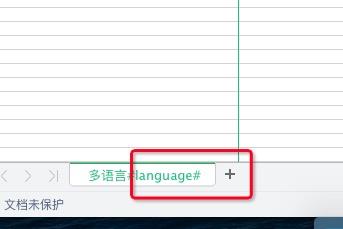
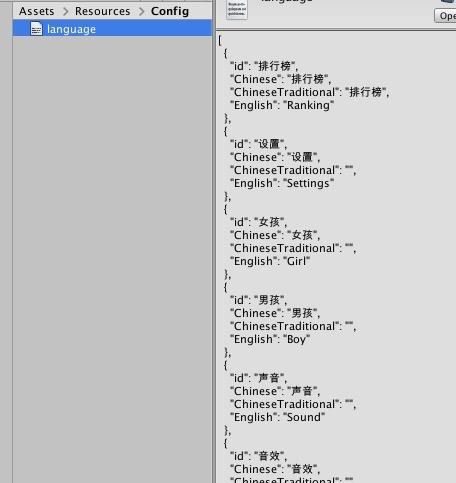
4 注意事项
1. excel文件名中不能存在空格或特殊符号
2. excel后缀只支持xlsx,并且需要确保后缀小写,不能使用大写
3. 导出的文件名确定后不要轻易修改,修改需要和程序确认(#文件名#)
4. 添加。删除。修改字段时,请和程序确定,防止游戏内逻辑出错
5. json中需要转换的数据结构由程序自行创建
6. 每次生成会清理config文件,重新从excel生成json文件。请不要手动修改生成后的json文件。确保excel文件的正确定。不要config文件夹下面放置其他文件
7. 使用工具的时候需要关闭excel文件
using UnityEngine;
using System.IO;
using System.Linq;
/// <summary>
/// @ 2017.12.25
/// 功能:通用静态方法
/// </summary>
public class GameUtility
public const string AssetsFolderName = "Assets";
public static string FormatToUnityPath(string path)
return path.Replace("\\\\", "/");
public static string FormatToSysFilePath(string path)
return path.Replace("/", "\\\\");
public static string FullPathToAssetPath(string full_path)
full_path = FormatToUnityPath(full_path);
if (!full_path.StartsWith(Application.dataPath))
return null;
string ret_path = full_path.Replace(Application.dataPath, "");
return AssetsFolderName + ret_path;
public static string GetFileExtension(string path)
return Path.GetExtension(path).ToLower();
public static string[] GetSpecifyFilesInFolder(string path, string[] extensions = null, bool exclude = false)
if (string.IsNullOrEmpty(path))
return null;
if (extensions == null)
return Directory.GetFiles(path, "*.*", SearchOption.AllDirectories);
else if (exclude)
return Directory.GetFiles(path, "*.*", SearchOption.AllDirectories)
.Where(f => !extensions.Contains(GetFileExtension(f))).ToArray();
else
return Directory.GetFiles(path, "*.*", SearchOption.AllDirectories)
.Where(f => extensions.Contains(GetFileExtension(f))).ToArray();
public static string[] GetSpecifyFilesInFolder(string path, string pattern)
if (string.IsNullOrEmpty(path))
return null;
return Directory.GetFiles(path, pattern, SearchOption.AllDirectories);
public static string[] GetAllFilesInFolder(string path)
return GetSpecifyFilesInFolder(path);
public static string[] GetAllDirsInFolder(string path)
return Directory.GetDirectories(path, "*", SearchOption.AllDirectories);
public static void CheckFileAndCreateDirWhenNeeded(string filePath)
if (string.IsNullOrEmpty(filePath))
return;
FileInfo file_info = new FileInfo(filePath);
DirectoryInfo dir_info = file_info.Directory;
if (!dir_info.Exists)
Directory.CreateDirectory(dir_info.FullName);
public static void CheckDirAndCreateWhenNeeded(string folderPath)
if (string.IsNullOrEmpty(folderPath))
return;
if (!Directory.Exists(folderPath))
Directory.CreateDirectory(folderPath);
public static bool SafeWriteAllBytes(string outFile, byte[] outBytes)
try
if (string.IsNullOrEmpty(outFile))
return false;
CheckFileAndCreateDirWhenNeeded(outFile);
if (File.Exists(outFile))
File.SetAttributes(outFile, FileAttributes.Normal);
File.WriteAllBytes(outFile, outBytes);
return true;
catch (System.Exception ex)
Debug.LogError(string.Format("SafeWriteAllBytes failed! path = 0 with err = 1", outFile, ex.Message));
return false;
public static bool SafeWriteAllLines(string outFile, string[] outLines)
try
if (string.IsNullOrEmpty(outFile))
return false;
CheckFileAndCreateDirWhenNeeded(outFile);
if (File.Exists(outFile))
File.SetAttributes(outFile, FileAttributes.Normal);
File.WriteAllLines(outFile, outLines);
return true;
catch (System.Exception ex)
Debug.LogError(string.Format("SafeWriteAllLines failed! path = 0 with err = 1", outFile, ex.Message));
return false;
public static bool SafeWriteAllText(string outFile, string text)
try
if (string.IsNullOrEmpty(outFile))
return false;
CheckFileAndCreateDirWhenNeeded(outFile);
if (File.Exists(outFile))
File.SetAttributes(outFile, FileAttributes.Normal);
File.WriteAllText(outFile, text);
return true;
catch (System.Exception ex)
Debug.LogError(string.Format("SafeWriteAllText failed! path = 0 with err = 1", outFile, ex.Message));
return false;
public static byte[] SafeReadAllBytes(string inFile)
try
if (string.IsNullOrEmpty(inFile))
return null;
if (!File.Exists(inFile))
return null;
File.SetAttributes(inFile, FileAttributes.Normal);
return File.ReadAllBytes(inFile);
catch (System.Exception ex)
Debug.LogError(string.Format("SafeReadAllBytes failed! path = 0 with err = 1", inFile, ex.Message));
return null;
public static string[] SafeReadAllLines(string inFile)
try
if (string.IsNullOrEmpty(inFile))
return null;
if (!File.Exists(inFile))
return null;
File.SetAttributes(inFile, FileAttributes.Normal);
return File.ReadAllLines(inFile);
catch (System.Exception ex)
Debug.LogError(string.Format("SafeReadAllLines failed! path = 0 with err = 1", inFile, ex.Message));
return null;
public static string SafeReadAllText(string inFile)
try
if (string.IsNullOrEmpty(inFile))
return null;
if (!File.Exists(inFile))
return null;
File.SetAttributes(inFile, FileAttributes.Normal);
return File.ReadAllText(inFile);
catch (System.Exception ex)
Debug.LogError(string.Format("SafeReadAllText failed! path = 0 with err = 1", inFile, ex.Message));
return null;
public static void DeleteDirectory(string dirPath)
string[] files = Directory.GetFiles(dirPath);
string[] dirs = Directory.GetDirectories(dirPath);
foreach (string file in files)
File.SetAttributes(file, FileAttributes.Normal);
File.Delete(file);
foreach (string dir in dirs)
DeleteDirectory(dir);
Directory.Delete(dirPath, false);
public static bool SafeClearDir(string folderPath)
try
if (string.IsNullOrEmpty(folderPath))
return true;
if (Directory.Exists(folderPath))
DeleteDirectory(folderPath);
Directory.CreateDirectory(folderPath);
return true;
catch (System.Exception ex)
Debug.LogError(string.Format("SafeClearDir failed! path = 0 with err = 1", folderPath, ex.Message));
return false;
public static bool SafeDeleteDir(string folderPath)
try
if (string.IsNullOrEmpty(folderPath))
return true;
if (Directory.Exists(folderPath))
DeleteDirectory(folderPath);
return true;
catch (System.Exception ex)
Debug.LogError(string.Format("SafeDeleteDir failed! path = 0 with err: 1", folderPath, ex.Message));
return false;
public static bool SafeDeleteFile(string filePath)
try
if (string.IsNullOrEmpty(filePath))
return true;
if (!File.Exists(filePath))
return true;
File.SetAttributes(filePath, FileAttributes.Normal);
File.Delete(filePath);
return true;
catch (System.Exception ex)
Debug.LogError(string.Format("SafeDeleteFile failed! path = 0 with err: 1", filePath, ex.Message));
return false;
public static bool SafeRenameFile(string sourceFileName, string destFileName)
try
if (string.IsNullOrEmpty(sourceFileName))
return false;
if (!File.Exists(sourceFileName))
return true;
SafeDeleteFile(destFileName);
File.SetAttributes(sourceFileName, FileAttributes.Normal);
File.Move(sourceFileName, destFileName);
return true;
catch (System.Exception ex)
Debug.LogError(string.Format("SafeRenameFile failed! path = 0 with err: 1", sourceFileName, ex.Message));
return false;
public static bool SafeCopyFile(string fromFile, string toFile)
try
if (string.IsNullOrEmpty(fromFile))
return false;
if (!File.Exists(fromFile))
return false;
CheckFileAndCreateDirWhenNeeded(toFile);
SafeDeleteFile(toFile);
File.Copy(fromFile, toFile, true);
return true;
catch (System.Exception ex)
Debug.LogError(string.Format("SafeCopyFile failed! formFile = 0, toFile = 1, with err = 2",
fromFile, toFile, ex.Message));
return false;
下载链接: https://pan.baidu.com/s/1uOlQg6qcn4gFH16aDx8B-Q?pwd=w23u 提取码: w23u
Unity3D日常开发Unity3D中实现Excel转XMLJsonCSV文件
推荐阅读
大家好,我是佛系工程师☆恬静的小魔龙☆,不定时更新Unity开发技巧,觉得有用记得一键三连哦。
一、前言
在日常开发中,可能会遇到将Excel表格转成其他格式文件的情况。
比如Excel转XML、Json、CSV文件,那么就来学习一下如何实现吧。
二、正文
2-1、导入读取Excel所需要的dll文件
读取Excel文件,需要导入一些dll文件,才能正常的读取、创建Excell文件:
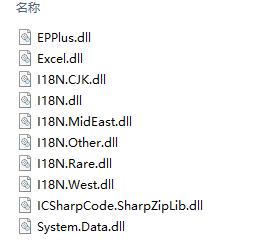
这些文件,我放到了CSDN按需下载:
https://download.csdn.net/download/q764424567/21046571
将下载后的dll文件放到Plugins文件夹内:
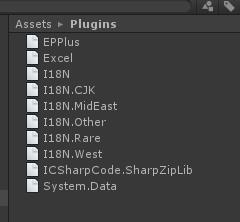
2-2、Excel文件转成Json、XML、CSV文件
在Project视图中,进入Scripts文件夹,新建一个Editor文件夹,然后在Editor文件内右击→Create→C# Script新建脚本, 命名为ExcelUtility,双击修改代码:
using UnityEngine;
using System.Collections;
using System.Collections.Generic;
using Excel;
using System.Data;
using System.IO;
using Newtonsoft.Json;
using System.Text;
using System.Reflection;
using System.Reflection.Emit;
using System;
public class ExcelUtility
/// <summary>
/// 表格数据集合
/// </summary>
private DataSet mResultSet;
/// <summary>
/// 读取表数据
/// </summary>
/// <param name="excelFile">Excel file.</param>
public ExcelUtility(string excelFile)
FileStream mStream = File.Open(excelFile, FileMode.Open, FileAccess.Read);
IExcelDataReader mExcelReader = ExcelReaderFactory.CreateOpenXmlReader(mStream);
mResultSet = mExcelReader.AsDataSet();
/// <summary>
/// 转换为Json格式文件
/// </summary>
/// <param name="JsonPath">Json文件路径</param>
/// <param name="Header">表头行数</param>
public void ConvertToJson(string JsonPath, Encoding encoding)
//判断Excel文件中是否存在数据表
if (mResultSet.Tables.Count < 1)
return;
//默认读取第一个数据表
DataTable mSheet = mResultSet.Tables[0];
//判断数据表内是否存在数据
if (mSheet.Rows.Count < 1)
return;
//读取数据表行数和列数
int rowCount = mSheet.Rows.Count;
int colCount = mSheet.Columns.Count;
//准备一个列表存储整个表的数据
List<Dictionary<string, object>> table = new List<Dictionary<string, object>>();
//读取数据
for (int i = 1; i < rowCount; i++)
//准备一个字典存储每一行的数据
Dictionary<string, object> row = new Dictionary<string, object>();
for (int j = 0; j < colCount; j++)
//读取第1行数据作为表头字段
string field = mSheet.Rows[0][j].ToString();
//Key-Value对应
row[field] = mSheet.Rows[i][j];
//添加到表数据中
table.Add(row);
//生成Json字符串
string json = JsonConvert.SerializeObject(table, Newtonsoft.Json.Formatting.Indented);
//写入文件
using (FileStream fileStream = new FileStream(JsonPath, FileMode.Create, FileAccess.Write))
using (TextWriter textWriter = new StreamWriter(fileStream, encoding))
textWriter.Write(json);
/// <summary>
/// 转换为CSV格式文件
/// </summary>
public void ConvertToCSV(string CSVPath, Encoding encoding)
//判断Excel文件中是否存在数据表
if (mResultSet.Tables.Count < 1)
return;
//默认读取第一个数据表
DataTable mSheet = mResultSet.Tables[0];
//判断数据表内是否存在数据
if (mSheet.Rows.Count < 1)
return;
//读取数据表行数和列数
int rowCount = mSheet.Rows.Count;
int colCount = mSheet.Columns.Count;
//创建一个StringBuilder存储数据
StringBuilder stringBuilder = new StringBuilder();
//读取数据
for (int i = 0; i < rowCount; i++)
for (int j = 0; j < colCount; j++)
//使用","分割每一个数值
stringBuilder.Append(mSheet.Rows[i][j] + ",");
//使用换行符分割每一行
stringBuilder.Append("\\r\\n");
//写入文件
using (FileStream fileStream = new FileStream(CSVPath, FileMode.Create, FileAccess.Write))
using (TextWriter textWriter = new StreamWriter(fileStream, encoding))
textWriter.Write(stringBuilder.ToString());
/// <summary>
/// 转换为Xml格式文件
/// </summary>
public void ConvertToXml(string XmlFile)
//判断Excel文件中是否存在数据表
if (mResultSet.Tables.Count < 1)
return;
//默认读取第一个数据表
DataTable mSheet = mResultSet.Tables[0];
//判断数据表内是否存在数据
if (mSheet.Rows.Count < 1)
return;
//读取数据表行数和列数
int rowCount = mSheet.Rows.Count;
int colCount = mSheet.Columns.Count;
//创建一个StringBuilder存储数据
StringBuilder stringBuilder = new StringBuilder();
//创建Xml文件头
stringBuilder.Append("<?xml version=\\"1.0\\" encoding=\\"utf-8\\"?>");
stringBuilder.Append("\\r\\n");
//创建根节点
stringBuilder.Append("<Table>");
stringBuilder.Append("\\r\\n");
//读取数据
for (int i = 1; i < rowCount; i++)
//创建子节点
stringBuilder.Append(" <Row>");
stringBuilder.Append("\\r\\n");
for (int j = 0; j < colCount; j++)
stringBuilder.Append(" <" + mSheet.Rows[0][j].ToString() + ">");
stringBuilder.Append(mSheet.Rows[i][j].ToString());
stringBuilder.Append("</" + mSheet.Rows[0][j].ToString() + ">");
stringBuilder.Append("\\r\\n");
//使用换行符分割每一行
stringBuilder.Append(" </Row>");
stringBuilder.Append("\\r\\n");
//闭合标签
stringBuilder.Append("</Table>");
//写入文件
using (FileStream fileStream = new FileStream(XmlFile, FileMode.Create, FileAccess.Write))
using (TextWriter textWriter = new StreamWriter(fileStream, Encoding.GetEncoding("utf-8")))
textWriter.Write(stringBuilder.ToString());
2-3、工具使用方法
使用方法:制作一个简单的编辑器工具,来快捷使用:
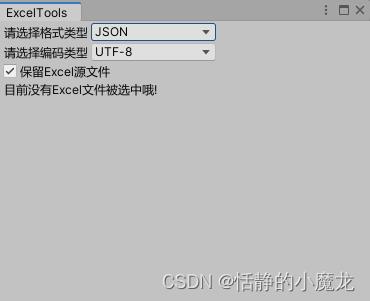
在Editor文件夹内,再新建一个脚本,命名为ExcelTools.cs,双击修改代码:
using UnityEngine;
using UnityEditor;
using System.Collections;
using System.Collections.Generic;
using System.Text;
public class ExcelTools : EditorWindow
/// <summary>
/// 当前编辑器窗口实例
/// </summary>
private static ExcelTools instance;
/// <summary>
/// Excel文件列表
/// </summary>
private static List<string> excelList;
/// <summary>
/// 项目根路径
/// </summary>
private static string pathRoot;
/// <summary>
/// 滚动窗口初始位置
/// </summary>
private static Vector2 scrollPos;
/// <summary>
/// 输出格式索引
/// </summary>
private static int indexOfFormat=0;
/// <summary>
/// 输出格式
/// </summary>
private static string[] formatOption=new string[]"JSON","CSV","XML";
/// <summary>
/// 编码索引
/// </summary>
private static int indexOfEncoding=0;
/// <summary>
/// 编码选项
/// </summary>
private static string[] encodingOption=new string[]"UTF-8","GB2312";
/// <summary>
/// 是否保留原始文件
/// </summary>
private static bool keepSource=true;
/// <summary>
/// 显示当前窗口
/// </summary>
[MenuItem("Plugins/ExcelTools")]
static void ShowExcelTools()
Init();
//加载Excel文件
LoadExcel();
instance.Show();
void OnGUI()
DrawOptions();
DrawExport();
/// <summary>
/// 绘制插件界面配置项
/// </summary>
private void DrawOptions()
GUILayout.BeginHorizontal();
EditorGUILayout.LabelField("请选择格式类型:",GUILayout.Width(85));
indexOfFormat=EditorGUILayout.Popup(indexOfFormat,formatOption,GUILayout.Width(125));
GUILayout.EndHorizontal();
GUILayout.BeginHorizontal();
EditorGUILayout.LabelField("请选择编码类型:",GUILayout.Width(85));
indexOfEncoding=EditorGUILayout.Popup(indexOfEncoding,encodingOption,GUILayout.Width(125));
GUILayout.EndHorizontal();
keepSource=GUILayout.Toggle(keepSource,"保留Excel源文件");
/// <summary>
/// 绘制插件界面输出项
/// </summary>
private void DrawExport()
if(excelList==null) return;
if(excelList.Count<1)
EditorGUILayout.LabelField("目前没有Excel文件被选中哦!");
else
EditorGUILayout.LabelField("下列项目将被转换为" + formatOption[indexOfFormat] + ":");
GUILayout.BeginVertical();
scrollPos=GUILayout.BeginScrollView(scrollPos,false,true,GUILayout.Height(150));
foreach(string s in excelList)
GUILayout.BeginHorizontal();
GUILayout.Toggle(true,s);
GUILayout.EndHorizontal();
GUILayout.EndScrollView();
GUILayout.EndVertical();
//输出
if(GUILayout.Button("转换"))
Convert();
/// <summary>
/// 转换Excel文件
/// </summary>
private static void Convert()
foreach(string assetsPath in excelList)
//获取Excel文件的绝对路径
string excelPath=pathRoot + "/" + assetsPath;
//构造Excel工具类
ExcelUtility excel=new ExcelUtility(excelPath);
//判断编码类型
Encoding encoding=null;
if(indexOfEncoding==0)
encoding=Encoding.GetEncoding("utf-8");
else if(indexOfEncoding==1)
encoding=Encoding.GetEncoding("gb2312");
//判断输出类型
string output="";
if(indexOfFormat==0)
output=excelPath.Replace(".xlsx",".json");
excel.ConvertToJson(output,encoding);
else if(indexOfFormat==1)
output=excelPath.Replace(".xlsx",".csv");
excel.ConvertToCSV(output,encoding);
else if(indexOfFormat==2)
output=excelPath.Replace(".xlsx",".xml");
excel.ConvertToXml(output);
//判断是否保留源文件
if(!keepSource)
FileUtil.DeleteFileOrDirectory(excelPath);
//刷新本地资源
AssetDatabase.Refresh();
//转换完后关闭插件
//这样做是为了解决窗口
//再次点击时路径错误的Bug
instance.Close();
/// <summary>
/// 加载Excel
/// </summary>
private static void LoadExcel()
if(excelList==null) excelList=new List<string>();
excelList.Clear();
//获取选中的对象
object[] selection=(object[])Selection.objects;
//判断是否有对象被选中
if(selection.Length==0)
return;
//遍历每一个对象判断不是Excel文件
foreach(Object obj in selection)
string objPath=AssetDatabase.GetAssetPath(obj);
if(objPath.EndsWith(".xlsx"))
excelList.Add(objPath);
private static void Init()
//获取当前实例
instance=EditorWindow.GetWindow<ExcelTools>()